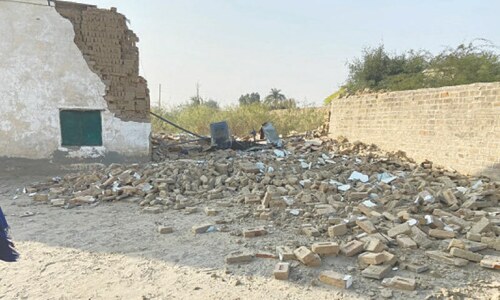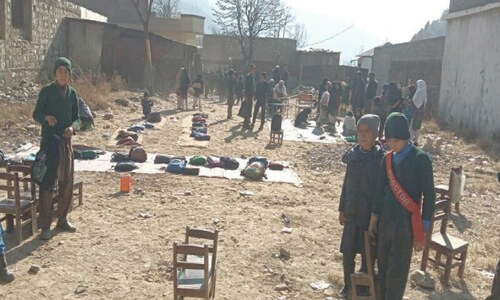SHANGLA: Police investigations have revealed that poor car checking at security posts and a lack of coordination among law-enforcement agencies led to the March 26 Bisham bus bombing that killed five Chinese workers and the Pakistani driver, say officials.
They told Dawn that the explosive-laden car that targetted the bus of Chinese workers reached Bisham from Balochistan’s Chaman area 10 days before the terrorist attack. The officials shared with Dawn the footage of CCTV cameras installed on the road from Shangla Top to the Bisham Maira area.
The video recording showed that the car entered Shangla by the Shangla Top in Alpuri tehsil early on March 15.
The car travelled through Chakdara in Malakand district and Swat district before crossing all checkpoints in Shangla district. It crossed around 30 police checkpoints from Chakdara to Bisham, according to the footage.
It also points out lack of coordination among law-enforcement agencies
A senior police official told Dawn that the bombing’s planners were also involved in the July 14, 2021, suicide attack on the bus carrying Chinese workers of the Dassu hydropower project in Upper Kohistan district.
Chinese nationals are working on most of the energy and other projects being executed in the region under the China-Pakistan Economic Corridor initiative.
A police official in Bisham told Dawn that the explosive-laden car was parked by the bomber’s facilitator at a filling station in the Shaga Maira area of Bisham on March 15 after the payment of Rs500 a night before both the bomber and his facilitator left for the Oghi area in Mansehra district.
He said the CCTV cameras installed at the filling station were out of order, and therefore, the movements of both terrorists couldn’t be filmed.
The official said the guard and the owner of the premises had been taken into custody for interrogation. He said Hazrat Bilal, the prime suspect in the attack, belonged to the Jag Dubair area of Lower Kohistan but currently lived in the Oghi area of Mansehra district.
The official said that the suspect was involved in the 2021 Dasu attack and was a close aide to Tariq alias Button Kharab, the planner of terrorist attacks from Afghanistan.
Senior officials of the counter-terrorism department told Dawn that all planners and facilitators of the Bisham bombing had been traced with the help of a SIM card, and they were based in both Pakistan and Afghanistan.
They said more arrests were also expected in the days ahead.
The officials saidMohammad Shafiq, a government Class-IV official, Wajid, from the Kohistan region, facilitated the March 26 Bisham suicide attack.
They said the car drove past the Bisham police station at 6:17am on March 26 that stood 3.5 kilometers from the blast site, while the two Chinese buses crossed that point at 12:49pm and reached the Lahore nullah at 01:01pm before being hit by the slow-moving explosive-laden car.
The investigators said the car moved between Bisham and Pandiar checkpoints, which bordered Kohistan, for eight hours, waiting for the Chinese convoy to show up.
They insisted that the bomber’s facilitator stayed in contact with an attack planner over the phone until the mission was accomplished.
A police officer in Bisham insisted he wrote a letter to his top bosses, insisting that the Chinese security officials never asked the police for help or informed them about the movement of their convoys.
He also said Chinese nationals worked in Kohistan, but the region’s police or intelligence officials didn’t share anything about the movement of those foreigners.
The government has already suspended RPO of Hazara region Ijaz Khan, DPO of Upper Kohistan Suliman Khan, DPO of Lower Kohistan Jamil Akhtar and Dasu project security officer over the “failure of security coordination” after the Bisham bus bombing.
A staff member of the Dasu Hydropower Project told Dawn that Chinese engineers and workers travelled to and from Islamabad in buses every two days via the Karakoram Highway, but arrangements for their security were never changed.
He, however, said the security of Chinese workers and the buses carrying them was significantly improved after the Dasu attack.
“Four to five security vehicles used to follow the buses with Chinese workers aboard,” he said.
When contacted, district police officer Imran Khan said no check posts in Shangla had scanners. He said police officials manually checked cars at all entry and exit points.
A senior law-enforcement officer told Dawn that there should be proper coordination among police, law-enforcement agencies, and Wapda and Chinese security officials, as well as proper vehicle examination at security checkpoints after the Dasu attack due to the vulnerability of Chinese workers.
“It is essential to change vehicles, routes, and bus timings, and even security vehicles should follow each of the buses instead of following both buses from front and back,” he said.
Published in Dawn, April 17th, 2024















































Dear visitor, the comments section is undergoing an overhaul and will return soon.